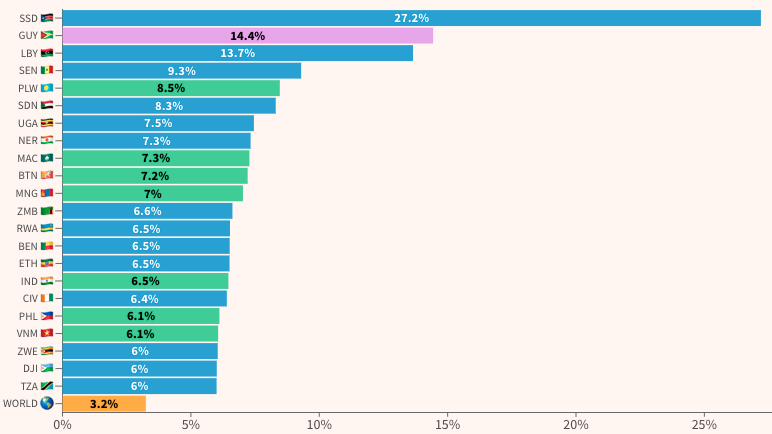1. 2025: The fastest-growing economies
As we look ahead to 2025, several economies are poised for significant growth, driven by various factors such as natural resource discoveries, political stability, and economic reforms. According to the latest forecasts from the International Monetary Fund and the World Bank, the global economy is expected to grow by 3.2% in 2025.
South Sudan: A Remarkable Rebound
Leading the pack is South Sudan, with an astounding projected GDP growth rate of 27.2%. This remarkable rebound follows a severe contraction in 2024 due to ongoing conflicts in neighboring Sudan. The IMF’s optimistic forecast assumes that peace will be restored, allowing for reconstruction and economic recovery.
Guyana: Riding the Oil Boom
In the Americas, Guyana stands out with a projected growth rate of 14.4. This small South American nation continues to benefit from an oil and gas boom, spurred by major offshore discoveries. The influx of foreign investment and increased production capacity are key drivers of this growth.
Libya: Resuming Oil Production
Libya is another notable mention, with an expected growth rate of 13.7% in 2025. The resolution of political disputes has allowed the country to resume full oil production, significantly boosting its economic prospects.
Senegal: Emerging Oil and Gas Producer
Senegal is forecasted to grow by 9.3, largely due to its recent emergence as an oil and gas producer. This growth is expected to be the highest since data collection began in 1980, although it remains subject to uncertainties in the global energy market.
Palau: Tourism and Construction Recovery
In the Asia-Pacific region, Palau is set to grow by 8.5%. The recovery of its tourism sector and increased construction activity post-pandemic are the main contributors to this growth.
India: Consistent Performer
India, the largest and most populous country on this list, is projected to grow by 6.5%. Continued economic reforms, a young workforce, and a burgeoning tech sector are key factors driving India’s steady growth.
Conclusion
While these projections are promising, they come with inherent uncertainties. Factors such as geopolitical tensions, market volatility, and global economic conditions can influence these outcomes. Nevertheless, the countries highlighted here are positioned to make significant strides in 2025, offering attractive opportunities for investors and signaling robust economic health.
2. Microsoft’s new Lisbon AI innovation centre

In a significant move to bolster the adoption of artificial intelligence (AI) across various sectors, Microsoft has inaugurated a new AI Innovation Centre in Lisbon, Portugal. This initiative is part of a collaborative effort with Accenture, Avanade, and Unicorn Factory Lisbon, aiming to position Lisbon as a leading hub for AI innovation.
A Hub for AI Excellence
Located in the Alvalade district, within the AI hub of Unicorn Factory Lisbon, the new centre is designed to foster creativity and collaboration. The 170-square-metre facility features open spaces for brainstorming, dedicated areas for conferences, and immersive environments for hands-on AI development. The centre’s primary goal is to accelerate the integration of AI technologies in both public and private sectors, thereby contributing to Portugal’s sustainable growth through digital innovation.
Strategic Partnerships and Vision
The AI Innovation Centre is a testament to the strategic partnership between Microsoft and its collaborators. Andrés Ortolá, General Manager of Microsoft Portugal, emphasised the centre’s potential to act as a catalyst for transformation. “Combining talent, ideas, and innovation, this centre will enable companies to lead, reinvent themselves, and grow in an increasingly digital business environment,” Ortolá stated.
Manuela Vaz Soares, Accenture’s Country Managing Director for Portugal, highlighted the importance of this partnership in transforming the business landscape in Portugal. “This centre symbolises the beginning of the next chapter in our journey to transform the business landscape in Portugal,” she said.
Empowering Businesses with AI
The centre offers a structured approach to AI adoption, divided into three immersive stages: envisioning workshops, strategy discussions, and architecture design sessions. These stages are designed to help businesses identify AI opportunities, develop implementation roadmaps, and create governance models for responsible AI use.
Gil Azevedo, CEO of Unicorn Factory Lisbon, noted that the partnership with Microsoft not only reinforces Lisbon’s status as an innovative city but also highlights the potential of the emerging innovation districts. “This strategic partnership with Microsoft, focused on AI, not only reinforces Lisbon’s standing as an innovative city but also highlights the potential of the emerging innovation districts we are developing,” Azevedo remarked.
Conclusion
The opening of the AI Innovation Centre in Lisbon marks a significant milestone in the city’s journey towards becoming a global leader in AI. By providing a collaborative space for businesses to explore and implement AI solutions, Microsoft and its partners are paving the way for a future where AI drives sustainable growth and innovation.
3. Thailand’s FDI Plans

In a bold move to position Thailand as a key player in the global economy, Prime Minister Paetongtarn Shinawatra has unveiled a comprehensive plan to attract foreign investment. Speaking at the Prachachat Thailand 2025: Opportunity—Hope—Reality event, Shinawatra emphasised the importance of political stability and strategic economic policies to foster a conducive environment for investors.
Key Focus Areas
The Prime Minister highlighted several critical sectors for investment, including data centers, semiconductor production, food, and healthcare. Notably, major projects such as Microsoft’s $1.7 billion data center and Dubai DAMAC group’s $1 billion data center have already set the stage for Thailand’s transformation into a tech hub.
Economic Growth and Stability
Shinawatra underscored the significance of political stability in attracting foreign direct investment. After a decade of military rule, the new civilian government has seen a surge in investment commitments, reflecting increased confidence in Thailand’s political and economic landscape. The value of investment proposals has risen by 42% in the first three quarters of 2024.
Adapting to Global Changes
With the potential challenges posed by a second Trump presidency, including high import tariffs, the Thai government is prepared to adjust its policies to protect its export sector. The Prime Minister assured the business community of the government’s readiness to implement changes to mitigate any adverse effects on the economy.
Future Vision
Looking ahead, Shinawatra’s administration aims to make Thailand a hub for data centers and semiconductor production, leveraging the country’s strategic location and robust infrastructure. The government is also focusing on enhancing education, particularly in multilingual proficiency, to support a skilled workforce.
Conclusion
Prime Minister Paetongtarn Shinawatra’s foreign investment plans are a testament to Thailand’s commitment to economic growth and stability. By fostering a favorable investment climate and adapting to global economic shifts, Thailand is poised to become a significant player in the international market.
4. Apple plans new $100m Indonesian Plant

In a significant move to bolster its manufacturing capabilities, Apple has proposed a $100 million investment to establish a new plant in Indonesia. This proposal comes in response to Indonesia’s recent ban on the sale of Apple’s iPhone 16 due to non-compliance with local regulations requiring that at least 40% of smartphone components be produced domestically.
The proposed facility, which is planned to be located in West Java, will focus on manufacturing accessories and components for Apple’s products. This investment marks a tenfold increase from Apple’s initial proposal of $10 million, reflecting the company’s commitment to meeting Indonesia’s stringent local content requirements.
Indonesia’s trade ministry has welcomed Apple’s investment commitment, with spokesperson Febri Hendri Antoni Arif stating that the proposal will be discussed in an upcoming meeting. This development is seen as a strategic move by Apple to enhance its supply chain and cater to the growing demand for its products in the Southeast Asian market.
Since 2018, Apple has invested significantly in Indonesia, including the establishment of application developer academies with a combined cost of $99 million. These academies aim to train local talent in app development, further integrating Apple into the Indonesian tech ecosystem.
The new plant is expected to create numerous job opportunities and contribute to the local economy, aligning with Indonesia’s goals of increasing domestic production and technological advancement. As Apple continues to expand its global footprint, this investment underscores the company’s strategy to navigate regulatory challenges and strengthen its presence in key markets.
5. Qatar’s Digital FDI Push

Qatar is making significant strides in its digital transformation journey, earmarking $2.47 billion to develop a robust digital ecosystem. This initiative is part of the country’s broader strategy to diversify its economy and reduce dependence on oil revenues.
Commitment to Digital Transformation
At the recent Digital Ecosystem Conference, organised by Ooredoo Group, HE the Minister of Communications and Information Technology, Mohammed bin Ali al-Mannai, reiterated Qatar’s unwavering commitment to fostering a digital environment conducive to innovation and growth. The Minister highlighted that Qatar is developing a specialised program aimed at facilitating foreign direct investment in the digital sector. This program focuses on streamlining procedures for emerging technology companies and offering incentives to attract global investors.
Legislative and Regulatory Enhancements
To support this initiative, Qatar is continuously evolving its legislative and regulatory framework. A new secure data law is set to be introduced soon, enhancing the regulatory environment and ensuring data protection. These efforts are designed to open new horizons for economic growth and enhance Qatar’s competitive position on the global stage.
Investment in Emerging Technologies
Qatar’s Digital Agenda 2030 is at the heart of this transformation. This roadmap aims to accelerate digital transformation, build a knowledge-based economy, and position Qatar as a leader in innovation. The country is investing heavily in emerging technologies, artificial intelligence, and innovation, laying the foundation for a digital future.
Collaborative Framework for Innovation
Aziz Aluthman Fakhroo, CEO of Ooredoo Group, emphasised the need for a collaborative framework where different stakeholders, including regulators and sector participants, work together to create an environment that encourages investment while ensuring public safety and fair competition. This approach is crucial for adapting to the rapid advancements in technology and their commercial applications.
Conclusion
Qatar’s proactive measures to attract FDI in the digital sector reflect its vision of becoming a global digital hub. By fostering a supportive regulatory environment and investing in cutting-edge technologies, Qatar is well on its way to achieving its digital transformation goals and enhancing its economic resilience.
Credit FDI Intelligence







